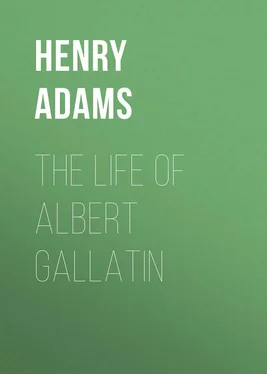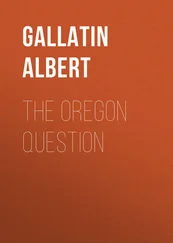Henry Adams - The Life of Albert Gallatin
Здесь есть возможность читать онлайн «Henry Adams - The Life of Albert Gallatin» — ознакомительный отрывок электронной книги совершенно бесплатно, а после прочтения отрывка купить полную версию. В некоторых случаях можно слушать аудио, скачать через торрент в формате fb2 и присутствует краткое содержание. Жанр: foreign_antique, foreign_prose, на английском языке. Описание произведения, (предисловие) а так же отзывы посетителей доступны на портале библиотеки ЛибКат.
- Название:The Life of Albert Gallatin
- Автор:
- Жанр:
- Год:неизвестен
- ISBN:нет данных
- Рейтинг книги:4 / 5. Голосов: 1
-
Избранное:Добавить в избранное
- Отзывы:
-
Ваша оценка:
- 80
- 1
- 2
- 3
- 4
- 5
The Life of Albert Gallatin: краткое содержание, описание и аннотация
Предлагаем к чтению аннотацию, описание, краткое содержание или предисловие (зависит от того, что написал сам автор книги «The Life of Albert Gallatin»). Если вы не нашли необходимую информацию о книге — напишите в комментариях, мы постараемся отыскать её.
The Life of Albert Gallatin — читать онлайн ознакомительный отрывок
Ниже представлен текст книги, разбитый по страницам. Система сохранения места последней прочитанной страницы, позволяет с удобством читать онлайн бесплатно книгу «The Life of Albert Gallatin», без необходимости каждый раз заново искать на чём Вы остановились. Поставьте закладку, и сможете в любой момент перейти на страницу, на которой закончили чтение.
Интервал:
Закладка:
“All could not be equally successful; few only could attain a distinguished eminence; but, as I have already observed, a far greater number of well educated and informed men were found in that small spot than in almost every other town of Europe which was not the metropolis of an extensive country. This had a most favorable influence on the tone of society, which was not light, frivolous, or insipid, but generally serious and instructive. I was surrounded by that influence from my earliest days, and, as far as I am concerned, derived more benefit from that source than from my attendance on academical lectures. A more general fact deserves notice. At all times, and within my knowledge in the years 1770-1780, a great many distinguished foreigners came to Geneva to finish their education, among whom were nobles and princes from Germany and other northern countries; there were also not a few lords and gentlemen from England; even the Duke of Cambridge, after he had completed his studies at Göttingen. Besides these there were some from America, amongst whom I may count before the American Revolution those South Carolinians, Mr. Kinloch, William Smith, – afterwards a distinguished member of Congress and minister to Portugal, – and Colonel Laurens, one of the last who fell in the war of independence. And when I departed from Geneva I left there, besides the two young Penns, proprietors of Pennsylvania, Franklin Bache, grandson of Dr. Franklin, – Johannot, grandson of Dr. Cooper, of Boston, who died young. Now, amongst all those foreigners I never knew or heard of a single one who attended academical lectures. It was the Genevese society which they cultivated, aided by private teachers in every branch, with whom Geneva was abundantly supplied.”
At the academy Albert Gallatin associated of course with all the young Genevese of his day. As most of these had no permanent influence on him, and maintained no permanent relations with him, it is needless to speak of them further. There were but two whose names will recur frequently hereafter. Neither of them was equal to Gallatin in abilities or social advantages, but in politics and philosophy all were evidently of one mind, and the fortunes of all were linked together. The name of one was Henri Serre, that of the other was Jean Badollet.
What kind of men they were will appear in the course of their adventures. A fourth, whose name is better known than those just mentioned, seems to have been a close friend of the other three, but differed from them by not coming to America. He was Étienne Dumont, afterwards the friend and interpreter of Bentham.
However enlightened the society of Pregny may have been under the influence of Voltaire and Frederic of Hesse, it is not to be supposed that Mme. Gallatin-Vaudenet or any other members of the Gallatin family were by tastes and interests likely to lean towards levelling principles in politics. Of all people in Geneva they were perhaps most interested in maintaining the old Genevese régime. The Gallatins were for the most part firm believers in aristocracy, and Albert certainly never found encouragement for liberal opinions in his own family, unless they may have crept in through the pathway of Voltairean philosophy as mere theory, the ultimate results of which were not foreseen. This makes more remarkable the fact that young Gallatin, who was himself a clear-headed, sober-minded, practical Genevan, should, by some bond of sympathy which can hardly have been anything more than the intellectual movement of his time, have affiliated with a knot of young men who, if not quite followers of Rousseau, were still essentially visionaries. They were dissatisfied with the order of things in Geneva. They believed in human nature, and believed that human nature when free from social trammels would display nobler qualities and achieve vaster results, not merely in the physical but also in the moral world. The American Revolutionary war was going on, and the American Declaration of Independence embodied, perhaps helped to originate, some of their thoughts.
1780.With minds in this process of youthful fermentation, they finished their academical studies and came out into the world. Albert was graduated in May, 1779, first of his class in mathematics, natural philosophy, and Latin translation. Before this time, in April, 1778, he had returned to Mlle. Pictet, and his principal occupation for the year after graduating was as tutor to her nephew, Isaac Pictet. Both Gallatin and Badollet were students of English, and the instruction given to Isaac Pictet seems to have been partly in English. Of course the serious question before him was that of choosing a profession, and this question was one in which his family were interested; in which, indeed, their advice would naturally carry decisive weight. The young man was much at Pregny with his grandparents, where, daring his childhood, he often visited Voltaire at Ferney. His grandmother had her own views as to his career. She wished him to take a commission of lieutenant-colonel in the military service of her friend the Landgrave of Hesse, with whom her interest was sufficient to insure for him a favorable reception and a promising future. At that moment, it is true, the military prospects of the Landgrave’s troops in the Jerseys were not peculiarly flattering, and the service can hardly have been popular with such as might remember the dying words of Colonel Donop at Red Bank; but after all the opportunity was a sure one, suitable for a gentleman of ancient family, according to the ideas of the time, and flattering to the pride of Mme. Gallatin-Vaudenet. She spoke to her grandson on the subject, urging her advice with all the weight she could give it. He replied, abruptly, that he would never serve a tyrant. The reply was hardly respectful, considering the friendship which he knew to exist between his grandmother and the Landgrave, and it is not altogether surprising that it should have provoked an outbreak of temper on her part which took the shape of a box on the ear: “she gave me a cuff,” were Mr. Gallatin’s own words in telling the story to his daughter many years afterwards. This “cuff” had no small weight in determining the young man’s course of action.
Yet it would be unfair to infer from this box on the ear that the family attempted to exercise any unreasonable control over Albert’s movements. If any one in the transaction showed himself unreasonable, it was the young man, not his relations. They were ready to aid him to the full extent of their powers in any respectable line of life which might please his fancy. They would probably have preferred that he should choose a mercantile rather than a military career. They would have permitted, and perhaps encouraged, his travelling for a few years to fit himself for that object. It was no fault of theirs that he suddenly took the whole question into his own hands, and, after making silent preparations and carrying with him such resources as he could then raise, on the 1st April, 1780, in company with his friend Serre, secretly and in defiance of his guardian and relations, bade a long farewell to Geneva and turned his back on the past.
The act was not a wise one. That future which the young Gallatin grasped so eagerly with outstretched arms had little in it that even to an ardent imagination at nineteen could compensate for the wanton sacrifice it involved. There is no reason to suppose that Albert Gallatin’s career was more brilliant or more successful in America than with the same efforts and with equal sacrifices it might have been in Europe; for his character and abilities must have insured pre-eminence in whatever path he chose. Both the act of emigration and the manner of carrying it out were inconsiderate and unreasonable, as is clear from the arguments by which he excused them at the time. He wished to improve his fortune, he said, and to do this he was going, without capital, as his family pointed out, to a land already ruined by a long and still raging civil war, without a government and without trade. This was his ostensible reason; and his private one was no better, – that “daily dependence” on others, and particularly on Mlle. Pictet and his grandmother, which galled his pride. That he was discontented with Geneva and the Genevan political system was true; but to emigrate was not the way to mend it, and even in emigrating he did not pretend that his object in seeking America was to throw himself into the Revolutionary struggle. He felt a strong sympathy for the Americans and for the political liberty which was the motive of their contest; but this sympathy was rather a matter of reason than of passion. He always took care to correct the idea, afterwards very commonly received, that he had run away from his family and friends in order to fight the British. So far as his political theories were concerned, aversion to Geneva had more to do with his action than any enthusiasm for war, and in the list of personal motives discontent with his dependent position at home had more influence over him than the desire for wealth. At this time, and long afterwards, he was proud and shy. His behavior for many years was controlled by these feelings, which only experience and success at last softened and overcame.
Читать дальшеИнтервал:
Закладка:
Похожие книги на «The Life of Albert Gallatin»
Представляем Вашему вниманию похожие книги на «The Life of Albert Gallatin» списком для выбора. Мы отобрали схожую по названию и смыслу литературу в надежде предоставить читателям больше вариантов отыскать новые, интересные, ещё непрочитанные произведения.
Обсуждение, отзывы о книге «The Life of Albert Gallatin» и просто собственные мнения читателей. Оставьте ваши комментарии, напишите, что Вы думаете о произведении, его смысле или главных героях. Укажите что конкретно понравилось, а что нет, и почему Вы так считаете.












